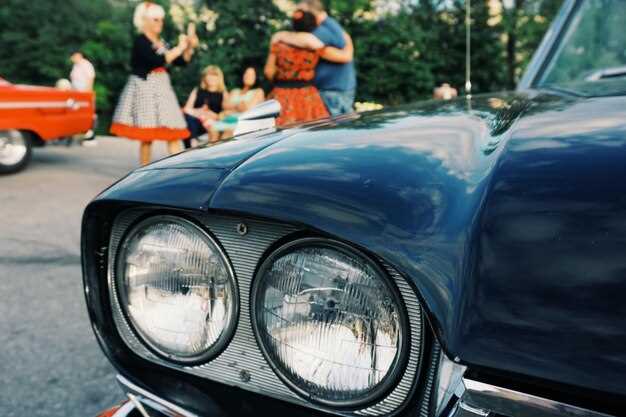
Purchasing vintage cars at estate auctions can be an exhilarating experience for collectors and enthusiasts alike. These events often present unique opportunities to bid on rare automobiles that may not be available elsewhere. However, diving into the world of auction sales requires careful preparation and a clear understanding of the bidding process.
Before participating in an auction, it is crucial to gather essential information about the vehicles of interest. Researching classic car models, expected market values, and the condition of each car can significantly bolster your confidence during the bidding process. Additionally, developing a strategy for your bids will help you stay within your budget while ensuring that you remain competitive against other bidders.
Furthermore, attending a preliminary viewing of the cars up for sale can provide valuable insights into their condition and provenance. Many auctions allow potential buyers to inspect the vehicles, which can help you spot any red flags that may affect your purchasing decision. Remember, preparation is key to successfully navigating the world of vintage car auctions and securing a prized addition to your collection.
Researching Vintage Cars Before the Auction
Before attending an estate auction, it’s crucial to conduct thorough research on the vintage cars that will be available for sale. Understanding the history, model specifications, and overall market value of these vehicles can significantly enhance your bidding strategy.
Start by identifying the specific models you are interested in. Utilize online resources, forums, and collector groups to gather detailed information about the performance, maintenance issues, and rarity of these cars. Knowledge of past sales and auction results for similar models will give you a benchmark for what to expect in terms of pricing.
Examine the vehicle’s provenance. Investigate its previous ownership, maintenance records, and any modifications made over the years. Cars with documented history often attract higher bids. Moreover, check if the car has won any awards or been featured in restoration shows, as these factors can elevate its value.
Another important aspect is to review the auction catalog provided by the estate. This document will list all cars for auction and often includes important details like the odometer reading, condition ratings, and estimated values. Pay close attention to any highlighted features or issues noted in the catalog.
It is also beneficial to connect with fellow enthusiasts and experts in the field. Engaging in conversations can reveal insights and opinions that are not readily available in written formats. Consider attending local car shows or vintage car gatherings to network and learn more about your chosen models.
Finally, prepare a checklist of specific points to inspect when viewing the cars in person before the auction starts. This should include looking for rust, checking the engine condition, evaluating the interior, and verifying that all parts are original where applicable. A detailed evaluation can help you make a well-informed decision and potentially avoid costly mistakes during the auction process.
Understanding Bidding Strategies for Estate Sales

Participating in estate auctions can be a rewarding experience, especially when it comes to vintage cars. To maximize your chances of winning a desired vehicle, it’s essential to adopt effective bidding strategies. Here are some valuable tips to enhance your estate sale experience.
First, research the vehicles that will be available at the auction. Understanding the car’s market value, condition, and historical significance can give you a competitive edge. Additionally, familiarize yourself with the auction process, including the rules and registration requirements, to avoid any surprises on the day of the sale.
Set a budget before the auction begins. Determine your maximum bid based on the car’s value and your financial situation. It’s crucial to stick to this limit during the bidding process to prevent overspending, especially in the heat of competition.
Attend pre-auction events or previews, if available. These gatherings provide a unique opportunity to inspect the cars closely and assess their condition. This firsthand experience can inform your bidding strategy and help you prioritize which vehicles to focus on during the sale.
During the auction, observe the bidding patterns of other participants. Understanding their strategies can help you gauge when to place your bids. Consider starting with a low initial bid to test the waters and engage in more aggressive bidding later if necessary.
Timing can significantly affect your chances of winning. Be mindful of crucial moments in the auction, such as the final minutes when emotions may run high. Placing a well-timed bid can catch others off guard and secure the vehicle at a lower price.
Finally, remain calm and composed throughout the process. Auctions can be fast-paced and intense, but keeping your emotions in check will enable you to make clear, rational decisions. By following these tips and employing sound bidding strategies, you can enhance your chances of acquiring the vintage car of your dreams at an estate auction.
Evaluating Condition and Value of Vintage Cars

When you attend an estate auction with vintage cars, understanding how to evaluate their condition and value is essential. Many buyers overlook this crucial step, which can lead to overbidding on vehicles that may not be worth the price. Here are some important tips for assessing vintage cars effectively.
First, start with a thorough inspection of the vehicle. Look for signs of rust, which can indicate underlying structural issues. Check the frame, fenders, and floorboards; these areas are critical for the car’s integrity. Additionally, examine the paint job for imperfections, which may reflect a lack of care or previous restoration work.
Next, evaluate the mechanical components. A vintage car should not only look good but also run smoothly. Turn on the engine and listen for unusual sounds. Take note of how the transmission shifts and whether the brakes are responsive. If you’re unfamiliar with mechanical aspects, consider bringing a knowledgeable friend or a mechanic to assist you in assessing the car’s functionality.
The value of vintage cars at estate auctions can vary significantly based on their condition. Factors such as rarity, historical significance, and market demand also come into play. Research similar models to understand their valuation in the current market. Websites and classic car guides can provide invaluable insights into pricing trends.
Another essential aspect to consider is documentation. Verify the car’s history, including any restoration work, service records, and ownership details. A well-documented vehicle typically has a higher value, as it offers transparency and proves the authenticity of the car.
Finally, during the bidding process, establish a budget based on your evaluations. Be prepared to walk away if the price exceeds your limit, as emotional decision-making can lead to overinvestment. Remember, successful buying at estate auctions involves both due diligence and strategic bidding.
